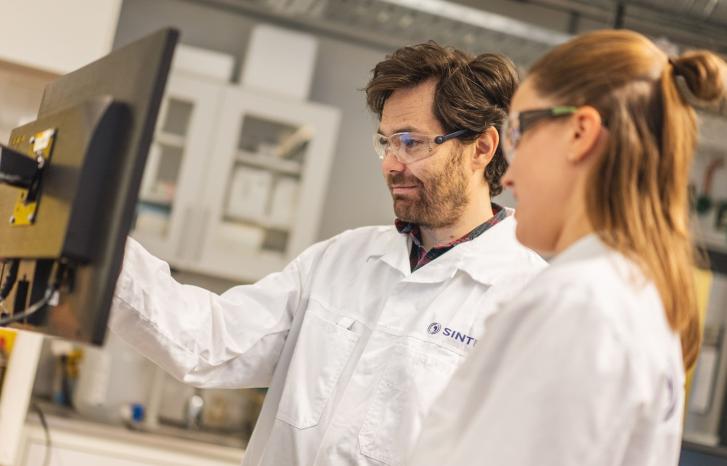‘We spend an average of 27 years documenting whether a medication is safe to use during pregnancy. I want to reduce that time to 2.7 years. Preferably even less!’
Hedvig Nordeng is professor of pharmacy at the University of Oslo, and recently won the Norwegian Association of Researchers’ Brain Power Award for her research on the use of medication by pregnant and breastfeeding women.
‘I want to protect these women with research, not from research.’
For a long time, there has been concerns about the consequences of medication for the unborn child. Pregnant women have therefore been excluded from participating in research with the intention of protecting them and their children.
When she says she would rather protect women with research, it is about obtaining sound knowledge on the safety of medications in pregnancy once they are on the market.
‘In the real world, it’s not merely enough to say that you shouldn’t give medication to pregnant women. Pregnant women, like the rest of the population, have chronic or acute conditions that require medical treatment.’
The NAR Brain Power Award is awarded annually to one or more members of NAR who, through their knowledge-based work, have made significant contributions to society.
The prize of NOK 200,000 was awarded on 5 November.
Forty-two candidates had been nominated by the Association’s members by the deadline 1 September. A recommendation committee selected five entries before the board of NAR selected the winner.
Awarded for the first time in 2013.
COVID-19 and international collaboration
Nordeng is currently involved in a major international research project on the effects of the COVID-19 pandemic and the COVID-19 vaccines on pregnant women. She highlights this as a good example of why it is important to reduce the time it takes to document the safety of a drug.
‘How long is it acceptable to wait for an answer to whether the vaccine can be safely used by pregnant women?’ she asks rhetorically.
The pandemic unequivocally showed the importance of establishing sound systems and international networks to map the effects of vaccines and drugs,’ says Nordeng.
‘Pharmaceutical companies, health authorities and academia must take their share of the responsibility. That means it’s not enough for Norway and Europe to lead the field alone,’ she says.
‘We have to work with the rest of the world. We must have established networks that can be mobilised quickly, so that we are better prepared for new epidemics and crises.’
‘I want to protect these women with research, not from research.’
The importance of maternal health
Today, up to eight out of ten women use some form of medication during pregnancy, Nordeng tells us. Figures from the Norwegian Prescription Database show that about six out of ten women take prescription medication during their pregnancy. Still, not knowing the consequences of taking a medicine may make people uncertain and worried, so that they choose not to get important medical treatment during pregnancy or while breastfeeding.
‘Medication is used to treat both serious and less serious conditions, and we need to be able to offer good, safe treatment to pregnant and breastfeeding women, in the same way as everyone else.’
She refers to larger studies that she has participated in on the use and safety of pharmaceuticals among women with severe mental illness as an example of the need to look at the child’s and the mother’s health in conjunction with each other.
‘We see that those who take the medication they need often do better than those who do not receive treatment. In some cases, failing to use medicines may actually be a greater risk than using them, especially if the mother has a severe illness.’
‘How long is it acceptable to wait for an answer to whether the vaccine can be safely used by pregnant women?’
The Norwegian Mother, Father and Child Cohort Study
Nordeng says that Norway is particularly well positioned for research on the effects of pharmaceuticals. Because the Norwegian health registries are of such high quality, researchers can access the necessary data to study how medicines work in the short and long term.
‘But there are some limitations to the register research. For example, we can only study the effects of prescription medication,’ she says.
Therefore, they are also conducting studies based on the Norwegian Mother, Father and Child Cohort Study (MoBa), which began in 1999 and recently celebrated its 25th anniversary. This is one of the world’s largest health surveys, with over 285,000 participants. Here, researchers also have access to blood samples from the participants and information about over-the-counter medicines from the questionnaires that the pregnant women have filled out.
By linking the MoBa survey to the health registries, they can investigate which diagnoses the children receive later in life, Nordeng explains.
‘For example, we can study whether children who have been exposed to antidepressants during pregnancy are more often diagnosed with ADHD compared with children of mothers who suffered from depression without medication. We have been able to disprove such a connection,’ she says.
‘By including genotypic data from the blood samples, we can also check the analyses for genetic vulnerability.’
From research to patient communication
The website TryggMammamedisin (translation: “safe medisin for mom”) was launched by Regional Medicines Information Centres (Relis) in 2011. The website can be used to look up which medicines are safe and unsafe to use during pregnancy and breastfeeding, but it also gives users the opportunity to get in direct contact with specialists in the field.
‘Such services depend on a sound knowledge base to be able to provide good advice. In my research, I am committed to providing a knowledge basis for clinical guidelines and advice.’
Reassuringly, Nordeng says that there are very few drugs that can cause serious birth defects. In Norway, birth defects occur in 3–4 per cent of all births. Of these, less than 1 per cent is due to the use of medication.
‘It’s good that so few drugs are harmful to the foetus. But we need knowledge about a wider range of side effects in pregnant women. For example, we must also find out whether the risk of miscarriage, low birth weight, pre-eclampsia and neurodevelopmental disorders in the child increases due to medication use.’
She sees the Brain Power Award as a confirmation of how important it is to close the knowledge gaps in research on medication use by pregnant and breastfeeding women.



